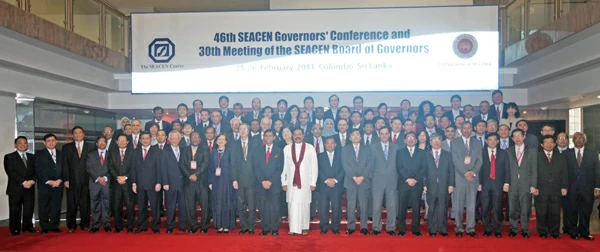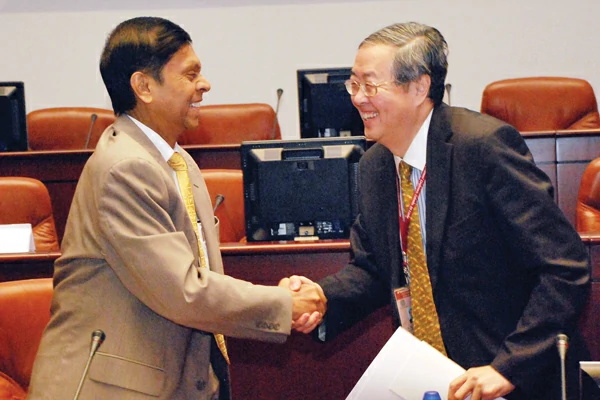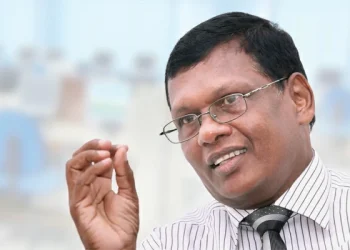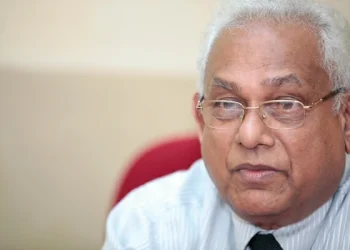
The 46th Conference of the Governors of the South East Asian Central Banks (SEACEN) Research and Training Centre, High Level Seminar and 30th Meeting of the SEACEN Board of Governors was held under the chairmanship of Ajith Nivard Cabraal, Governor of the Central Bank of Sri Lanka. The theme of the conference was “Post Global Financial Crisis: Issues and Challenges for Central Banks of Emerging Markets”.
Delivering the inaugural address, President Mahinda Rajapaksa welcomed The People’s Bank of China as a new member of SEACEN. He stressed that the Conference theme was appropriate given the extensive and far reaching impact of the recent global financial crisis. He added that the resilience of Asian countries was a testament to the effectiveness of the measures that were taken after the Asian crisis to strengthen these economies. He emphasised the need for maintaining sound macroeconomic fundamentals and a strong financial system to withstand future crises.
The President also cautioned that although the worst of the crisis was behind us, this period of relative calm should be used to strengthen the world economic and financial framework.
Welcoming the participants, Ajith Nivard Cabraal, noted that since the speed at which global economic and financial developments affected the rest of the world is now much faster than before, today’s central bankers are facing greater challenges. Therefore, he welcomed the opportunity to share experiences and strengthen collaboration among Governors.
Nayouki Shinohara, Deputy Managing Director of the International Monetary Fund in his keynote address noted that the multi speed global recovery is being led by Asia. He added that developing Asia will see its growth remain as high as eight and a half percent this year-from nearly nine and a half percent in 2010-and the region should contribute the lion’s share of global growth over the next few years. However, he noted that there were downside risks to the recovery in advanced economies due to fiscal vulnerabilities and the upward price pressures faced by emerging markets from rising commodity prices. He said that emerging markets are benefiting from world trade, which grew sharply in 2010, and now face a more challenging, but positive, outlook. They are expected to grow at a healthy rate of six and a half percent in 2011, but inflation pressures are mounting, he said.
The governors noted the challenges facing emerging markets during the post-global financial crisis from the perspective of SEACEN central banks. These include the exit strategies to phase out the macroeconomic stimulus packages implemented during the recent crisis. They observed that any transition strategy must be compatible with the emerging domestic and international environment and should be well coordinated and appropriately sequenced. In addition, they stressed the need for strong leadership and decisive action, particularly in periods of crisis. They recognised that price stability could no longer be the single focus of central banks and emphasised a greater role for central banks in fostering financial stability due to the increasing linkages between the macroeconomic environment and the financial sector. They emphasised the need for sound macroeconomic policies, complemented by macro-prudential measures to ensure a strong economic and financial system.
The governors further discussed the vulnerability from large and volatile capital flows and its implications for monetary and exchange rate policies and emphasised that the effectiveness of the policy choice depends on the nature of capital flows. They discussed the need for a more robust surveillance system and greater cross border cooperation to monitor capital flows. They also emphasised the need for a more developed financial system to mediate these capital flows and a more liberalised environment to encourage outward investment. The governors also discussed the need to pay more attention to the volatility in the exchange rate caused by capital flows, as it had an adverse impact on small open economies.
The governors accepted with thanks the offer of The Bank of Korea to host the 47th Conference of SEACEN Governors and 31st Meeting of the SEACEN Board of Governors in 2012.
Finally the governors expressed their gratitude to President Mahinda Rajapaksa, for his presence at the Opening Ceremony. They further expressed their appreciation to Ajith Nivard Cabraal, Governor of the Central Bank of Sri Lanka and his staff for the excellent arrangements and warm hospitality in hosting this year’s SEACEN Governors’ Conference, High Level Seminar and SEACEN Board of Governors’ Meeting. The Governors congratulated the Central Bank of Sri Lanka on its 60th Anniversary.






